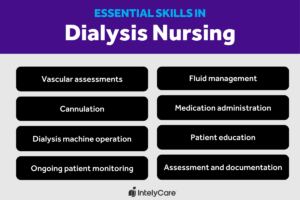How to Become a Dialysis Nurse

Picture this — a dialysis nurse asks her patient, Mr. Anderson, about his family while feeling the thrill of a fistula in his arm. She sees Mr. Anderson three times a week, and she listens intently as he tells her about his four grandchildren. With a steady hand, she inserts two needles into Mr. Anderson’s arm and monitors the blood flow amidst the rhythmic hum of dialysis machines. This is a moment in the life of many dialysis nurses.
What Is Dialysis?
Dialysis is a treatment that uses machines to remove excess water, solutes, and toxins from the blood when the kidneys cannot. This procedure is essential for patients who are in acute and chronic kidney failure — without dialysis, many patients with chronic kidney disease can die within weeks. Nearly 4 million people in the world rely on kidney replacement therapy to live.
Dialysis nurses help these patients live better, longer lives. If you’re interested in building long-standing patient relationships and you enjoy a routine, consider becoming a certified dialysis nurse.
What Does a Dialysis Nurse Do?
Dialysis nurses fall under the umbrella of nephrology nursing and specialize in managing patients undergoing dialysis treatments. Their main responsibilities revolve around administering dialysis, watching for signs of infection, and educating patients about their health. A certified dialysis nurse also provides essential emotional support for patients and their families during this process.
There are three types of dialysis:
- In-center hemodialysis is when a patient comes into a center to have their blood treated with dialysis machines.
- At-home hemodialysis is when a patient and their family learn to treat themselves with hemodialysis at home.
- Peritoneal dialysis, commonly done at home, uses the peritoneal membrane in the abdomen to filter solutes and fluid out of the body.
Depending on where you work, the skills required in this role may vary. Daily tasks for hemodialysis nurses working in the clinic environment include:
- Vascular assessments: Focused assessments include looking for any signs of infection at the site of a fistula, graft, or catheter, and ensuring that the site is patent.
- Cannulation: Initiating dialysis is a clinical skill that involves inserting needles into a patient’s access port.
- Dialysis machine operation: Dialysis nurses follow protocols for how much fluid to pull off of a patient per session. You’ll need to be able to set these machines, solve problems with flow, and feel comfortable troubleshooting.
- Ongoing patient monitoring: Regularly assessing and monitoring vital signs before, during, and after dialysis sessions.
- Fluid management: Monitoring and managing fluid removal during dialysis while preventing dehydration or excess fluid retention.
- Medication administration: Administering medications specific to dialysis patients, such as heparin, to prevent clotting during sessions.
- Patient education: Providing comprehensive education to patients and families regarding diet, medication adherence, vascular access care, and lifestyle modifications.
- Assessment and documentation: Thorough assessment of patient conditions, recording observations, and maintaining accurate patient records.
To get a better understanding of what you might do in this role, check out a sample dialysis nurse resume.
How to Become a Dialysis Nurse: 3 Steps
If you’re interested in this role, you’re in luck. The track to enter this specialty is shorter than others, because clinics often accept new graduates without nursing experience. Here’s how to enter dialysis nursing.
Step 1: Nursing School
Dialysis nurse requirements start with nursing school. Both LPNs and RNs can become dialysis nurses. LPNs usually complete a diploma program or an associate degree in nursing, while RNs either obtain an associate or bachelor’s degree in nursing. During nursing education, students learn fundamental clinical skills, patient care techniques, and gain basic knowledge about renal care, which forms the foundation for specialized dialysis nursing practice.
Step 2: Passing the NCLEX
After completing nursing school, aspiring dialysis nurses must pass the National Council Licensure Examination (NCLEX) to become licensed nurses. LPNs take the NCLEX-PN, while RNs take the NCLEX-RN. This standardized exam assesses the basic knowledge, skills, and abilities essential for safe and effective nursing practice. Once you’ve passed, you can enter dialysis nursing as a new graduate nurse.
Step 3: Earn Specialty Dialysis Nurse Certification
If you’re interested in deepening your expertise, you can pursue a dialysis nurse certification. Here are the top certifications that show your commitment to this specialty:
- Certified Dialysis Nurse (CDN)
- Certified Nephrology Nurse (CNN)
- Certified Hemodialysis Nurse (CHN)
- Certified Peritoneal Dialysis Nurse (CPDN)
If you work in an outpatient center, consider an Ambulatory Care Nursing Certification (AMB-BC).
Where Does a Dialysis Nurse Work?
A certified dialysis nurse helps patients understand their dialysis options and access this vital treatment. If you’re thinking about dialysis nursing, you could work in one of these areas in this role:
- Dialysis clinics
- Home health agencies
- Acute care hospitals
Keep in mind that in the outpatient clinic jobs, a single nurse might be caring for nine patients at once with the help of other nursing staff. In the home setting, dialysis nurses teach patients to operate, monitor, and assess their own dialysis treatments. In home health nurse jobs, nurses will still visit patients every once in a while to be sure they’re on track.
The Pros and Cons of Dialysis Nursing
Every nursing role has advantages and disadvantages. Here are some of the things that might draw you to this specialty:
- Scheduling: Clinic dialysis nurses work during weekdays, and holidays and weekends are rare. On the other hand, morning shifts in dialysis can start as early as 5 a.m. Dialysis nurses in acute care may still work long hours and holidays.
- Relationships: Many dialysis patients receive treatment a few times a week, so you’ll have the opportunity to get to know the patients you serve. Dialysis nurses tend to enjoy getting to know their patients (but this can be a downside if patients are difficult).
- Specialization: Because dialysis is a specialized area, there are great opportunities to enhance a focused skill set in dialysis.
On the other hand, you may find that these factors are drawbacks to dialysis nursing:
- Emotional toll: Working with patients with chronic diseases can be challenging. For example, you can take care of a patient for years, and feel grief when they die.
- Patient load: Dialysis can have high patient ratios, and managing so many patients at once can be stressful.
- Emergency support: Dialysis clinics are typically stand-alone facilities, so if an emergency happens, there’s not much clinical support. Acute dialysis clinics inside hospitals may have more resources to respond if a patient codes, has a stroke, etc.
How Much Do Dialysis Nurses Make?
The average dialysis nurse salary is $88,600 per year. This can vary widely depending on your education, experience, facility, and location. For example, these are the states that ay the highest annual RN salaries:
Find Nursing Jobs That Fit Your Life
Interested in becoming a dialysis nurse? IntelyCare can match you with nursing jobs in this and other specialties so you can streamline your search. Learn more today.




